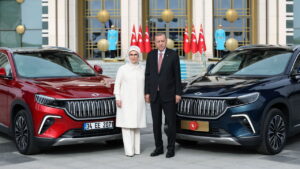
Turkish electric car manufacturer TOGG (Türkiye’nin Otomobili Girişim Grubu) has announced its entry into European markets and the introduction of new digital solutions, including the option to pay for cars with cryptocurrency, according to Autogeek.
According to the report, the company plans to open its first showrooms in Germany, the Netherlands, and Switzerland in 2025, as well as begin sales in other EU markets.
TOGG has already introduced the T10X electric crossover in Europe, which will be the brand’s first mass-produced export vehicle.
Buyers will have access to the innovative digital platform “Trumore,” through which they can place an order, select a configuration, and pay for their purchase — including using cryptocurrency or tokens issued within the TOGG ecosystem.
According to the company’s management, the integration of blockchain payments reflects its digitalization strategy and opens up new opportunities for users by combining electric mobility, fintech, and smart infrastructure.
“We are not just building a car, but a digital ecosystem where transportation, communications, and finance are combined into a single platform,” said TOGG CEO Gürcan Karakaş.
The company already produces electric vehicles at its plant in Gemlik (Bursa province). Production capacity is designed for 175,000 cars per year, with plans to increase this to 1 million units by 2035.
TOGG sees its entry into Europe as a strategic step towards promoting Turkish technology and integrating into the EU market.

The real scale of unemployment in Europe may be almost twice as high as the official figure — up to 26.8 million people. These figures are based on statistics that take into account so-called “hidden unemployment,” according to Euronews, citing Eurostat data.
According to official data, there are about 13.3 million officially unemployed people in the European Union. However, if we include those who are not actively looking for work, those who want to work more hours, or those who are looking but cannot start immediately, the increase in the number of unemployed reaches 26.8 million.
In terms of European statistics, this is called the labor market slack/underemployment/mismatch. In the second quarter of 2025, the underutilization of labor resources amounted to 11.7% of the expanded labor force (according to the original publication).
Countries with the highest levels of “hidden unemployment”:
• Turkey — 25.8%
• Finland — 19.5%
• Sweden — 18.8%
• Spain — 18.6%
• Bosnia and Herzegovina — 17.1%
• Italy — 15.4%
Countries with low levels of “hidden unemployment” include Poland (~5.1%), Slovenia, Malta, and Bulgaria (all below 6%).

Almost 690 million tourists made international trips in the first half of 2025, which is almost 5% or 33 million more than a year ago, according to the UN World Tourism Organization (UN Tourism).
“The number of international tourist trips in the first six months of 2025 increased by 5% compared to the same period in 2024 and amounted to almost 690 million. This is approximately 4% more than in the same period before the pandemic,” the report says.
According to UN Tourism, the highest growth rates in tourist trips in the first half of the year were recorded in Africa, up 12% compared to the same period last year. In North Africa and sub-Saharan Africa, the increase was 14% and 11%, respectively.
Europe received about 340 million tourists in six months, which is 4% more than in the same period last year and 7% more than in pre-pandemic 2019. The main destinations for travel in Europe, France and Spain, increased by 5%. In Central and Eastern Europe, the growth rate is even higher, at 9% compared to the first half of 2024, while inbound tourist flows are 11% lower than before the pandemic.
The number of tourists in North and South America increased by 3%, while the results for individual regions were uneven. South American countries recorded a 14% increase in tourist arrivals, Central America recorded a 2% increase, while North America saw no growth due to a decline in tourist trips to the US and Canada. The Caribbean region also saw a decline, partly due to lower demand from its main tourist market, the US.
In the Middle East, the number of tourist trips fell by 4% in the first half of the year, while compared to 2019, the increase was 29%. As noted by UN Tourism, these are the highest growth rates among all macro-regions.
The number of arrivals in the Asia-Pacific region during this period increased by 11%, which is 92% of the pre-pandemic level. Northeast Asia showed the highest figures among the world’s subregions: in the first half of the year, tourist traffic here grew by 20% compared to the same period last year.
According to UN Tourism, among the major tourist destinations, the largest increase in tourist trips was recorded in Japan and Vietnam (up 21%), Morocco (up 19%), South Korea (up 15%), Malaysia and Indonesia (up 9%), as well as Hong Kong, Mexico, and the Netherlands (up 7%).

Vietnam has significantly expanded its visa-free regime, adding 12 European countries to the list of countries whose citizens can stay in the country for up to 45 days without a visa. This is valid from August 15, 2025, to August 14, 2028, and covers EU countries such as Belgium, Poland, the Czech Republic, and others that have joined the existing list, which includes France, Japan, the UK, and others.
This has signaled a revival in the resort real estate market: tourists with long visa-free periods and high incomes have become actively interested in buying villas, apartments, and condo hotels, especially in tourist areas. The Vietnam Association of Real Estate Agents (VARS) notes an increase in demand and a steady recovery in the sector.
The foreign population in the country is small but diverse:
Real estate purchase prices (per square meter):
Rental prices (per month):

Consulting firm Deloitte has published the 14th edition of its Property Index 2025 report on European housing markets. The study covers 28 countries and notes how markets are adapting to high rates amid weak supply: affordability in a number of capitals remains at multi-year lows, and demand is shifting to rentals. Deloitte
The least affordable capitals are Amsterdam (15.4 annual salaries for a “typical” 70 m² apartment), Athens (15.3), and Prague (15.0); Košice ranks fourth (14.2). At the opposite end of the spectrum are Odense (Denmark) and Turin (Italy), where the average purchase price is 4.9 times the annual income, as well as Manchester (UK) — 5.3.
Ukraine was not included in this study.
Deloitte notes that against the backdrop of a “bottleneck” with new projects and continuing demand, the rental segment is strengthening (rent increases are noticeable not only in capital cities but also in regional centers). At the same time, high rents and regulatory lags in permits continue to put pressure on property affordability, especially in large agglomerations.
Deloitte Property Index 2025 — a comparative study of European housing markets: prices for new buildings, affordability (in years of gross salary for a 70 m² apartment), rental dynamics, and mortgage rates. Key findings and figures are available on the Deloitte Property Index 2025 report page.

Discussions on the Ukrainian settlement between a number of European leaders are scheduled for Thursday in France, the Financial Times (FT) reported on Sunday.
“Those who previously met with (US President Donald) Trump in Washington are expected to gather in Paris on Thursday at the invitation of French President Emmanuel Macron to continue high-level discussions,” the publication writes, citing diplomatic sources.
“Among those present will be German Chancellor Friedrich Merz, British Prime Minister Keir Starmer, NATO Secretary General Mark Rutte, and European Commission President Ursula von der Leyen,” the FT notes.
No official announcement has been made about this meeting yet. The meeting is expected to be a continuation of discussions on security guarantees that the US and EU countries could provide to Ukraine after the war ends. These include the deployment of several tens of thousands of European troops in the country, according to the article.
In turn, in an interview with the FT, von der Leyen said that Europe is working on a plan to “deploy multinational forces with American support.”
“President Trump has assured us that American support will be part of the guarantees. He has repeatedly and clearly confirmed this,” she said.